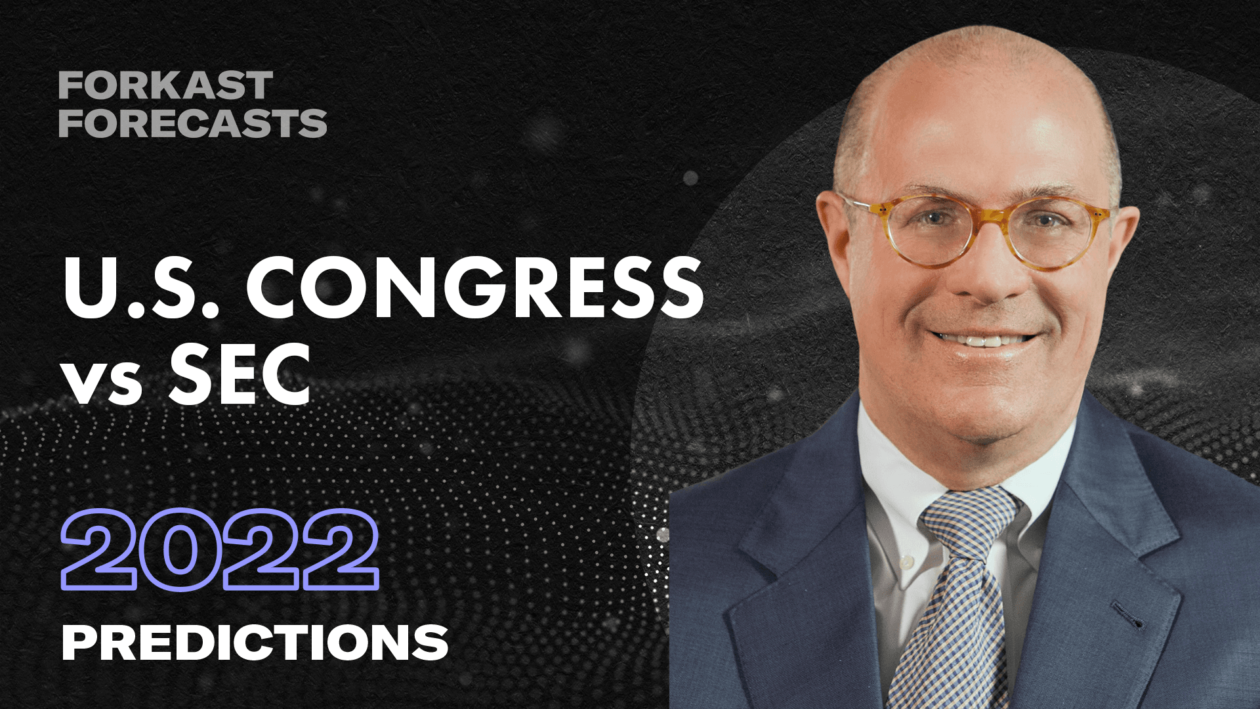Welcome to Forkast Forecasts 2022. In this series, leaders, innovators and visionaries in blockchain-related fields tell Forkast.News their predictions for the year ahead.
J. Christopher Giancarlo
J. Christopher Giancarlo is co-founder of the Digital Dollar Foundation, which advocates for the development of a fiat U.S. digital currency. He is senior counsel at law firm Willkie Farr & Gallagher and is co-chair of the Willkie Digital Works practice. Giancarlo was chairman of the Commodities Futures Trading Commission from 2014-’19 and during his tenure acquired the nickname CryptoDad for his progressive stance on crypto regulation.
Predictions for 2022
U.S. warms to Web 3.0
“Up until now, it’s been left to regulators to formulate an official sector response to Web 3.0. During my time at the CFTC, that response was a very positive, forward leaning one. Lately, the response has been a much harsher one. We’ve gone from something of a passive-aggressive to an aggressive-aggressive response from regulators. Certainly that is the approach of the SEC. … What I’m expecting to see in 2020, that Congress is really going to start thinking about crypto and the emerging 3.0 landscape as a new opportunity to formulate a crypto native response. … What I’m expecting in 2022 is for legislators to start keeping pace with this innovation and hopefully come up with a new regulatory framework that is much more suitable for this emerging new ecosystem.”
Congressional pushback of the SEC
“Congressmen and women are getting much further up the curve and the same is happening in the Senate. That’s all for the good. You’ll see them pushing back in some quarters to some degree against the very regressive approach of the SEC. Crypto has opened up financial inclusion to far more people. It’s captured the imagination of far more young people than Wall Street’s been able to do in a generation. And this approach of the SEC to investor protection that says that basically it’s going to protect you from participating in the most exciting new ventures and limit those to just rich and wealthy accredited investors, that regressive approach cuts against the very progressive approach that crypto is presenting. So I’m expecting Congress to get in the game and begin pushing back against that.”
Million dollar question
“I’m also expecting that 2022 will be the year when you see much greater advancement of central bank digital currencies and specifically a digital dollar here in the United States. The Fed is going to move much further in this year than they have in the last few years. And quite frankly, the Digital Dollar Project, which I launched several years ago, is going to have a very active 2022 to begin some experimentation and pilot projects to look at what role a central bank digital currency can play in this new evolving marketplace. Not exclusively, because I support the development of all kinds of non-sovereign efforts, but also to make sure that if the United States launches a central bank digital currency, a digital dollar, that it reflects societal values of a free society.”
Let a thousand flowers bloom
“I’m hopeful that a free and open society accepts a lot of diversity in its payment systems, in its ability to transfer value, and I hope that the U.S. approach to Web 3.0 is very much like the U.S. approach to Web 1.0: to let a thousand flowers bloom and to allow this innovation to take place. We are already seeing it around the world, that over 80 of the world’s major central banks are already experimenting with central bank digital currency. Ultimately the attractions of this will be such that the United States itself will do this. We launched the Digital Dollar Project to make sure that the values that a free society holds dear — values like economic liberty and privacy and freedom from censorship — are enshrined in whatever digital dollar, whatever central bank digital currency the Fed may decide to roll out in the future.”

